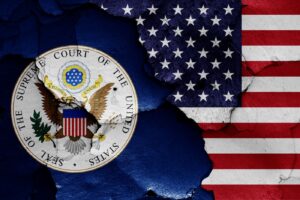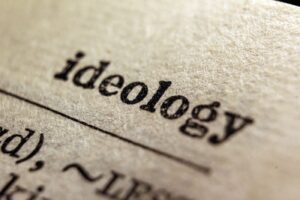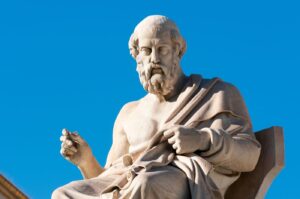After publishing articles recently in the Washington Post and First Things, both arguing that the defenders of conjugal marriage between a man and a woman should not be tarred as irrational bigots, “haters,” or “theocrats” by the advocates of same-sex marriage, I received e-mail messages from likeminded friends hailing me for my “courage.” I was grateful for their appreciation, but a little mystified at what I took to be overstatement. I find little reason to hail the “courage” of someone who defends the consensus view of the whole history of human civilization—that marriage is a bedrock social institution that unites a man and a woman in order to make a family—as rational and well intended. But one of the kind notes came from a friend who was about to leave for Cuba to help beleaguered Christians there, persons of whom the word “courage” can be used without embarrassment. So what was going on?
It was simple: my correspondents were academics, writing from within the establishment of American higher education, where it can be very uncomfortable to speak out against the idea of same-sex marriage. Are people’s jobs on the line if they dissent? This is harder to say with certainty, and the circumstances will not be the same everywhere. The deadly combination of unchallenged liberal presumptions and casual intimidation of dissenters is probably at its worst in the most prestigious universities, which set the tone for the rest of the country, on this issue as on many others. But in all except the most resolutely religious colleges, there is no doubting that the default position of the American academy is to dismantle the institution of marriage and remake it on a new basis. The result is a good deal of self-silencing—self-exile into the “new closet” on issues involving sexuality—not just by students but by faculty, too. The path of least resistance turns out to be the path of no resistance. For institutions that claim to be homes of diverse views and free inquiry in the pursuit of truth, this creeping orthodoxy is a sign of wounded institutional integrity and failed leadership.
The same harm to institutional integrity, and the same ethical failure of institutional leaders, is now publicly on display in the most elite precincts of the legal profession. On April 18, the press reported that Paul Clement, former solicitor general in the last administration, would take up the cause, so contemptibly abandoned by the current administration, of defending the Defense of Marriage Act in federal litigation, with Clement’s firm, Atlanta-based King & Spalding, engaged by the House of Representatives.
One week later, on April 25, King & Spalding’s chairman Robert Hays announced that the firm was withdrawing from its representation of the House, apparently leaving DOMA’s defense without legal counsel in federal court. Notwithstanding the blandishments of Mr. Hays about “inadequate” vetting of the decision to take the case, it was evident to everyone that this retreat was made under pressure, with the gay advocacy group Human Rights Campaign leading a concerted political and economic campaign to bring the firm to heel. Within an hour or two on the same day came the news that Clement was decamping from King & Spalding to take new employment at Washington’s Bancroft law firm, and intended to continue his representation of the House, and of the interests of the United States, in the DOMA litigation. In his letter of resignation from King & Spalding, Clement describes his conduct as the only “honorable course,” saying he was driven by “loyalty to the client and respect for the profession” of law. “Defending unpopular positions is what lawyers do,” he wrote, adding that the “adversary system of justice” and “the rule of law” itself are at stake. Clement finished by quoting the late Griffin Bell, once a King & Spalding partner as well as attorney general in the Carter administration: “You are not required to take every matter that is presented to you, but having assumed a representation, it becomes your duty to finish the representation.”
Supporters of the Defense of Marriage Act were quick to hail Paul Clement’s courage, and he certainly deserves praise for his unhesitating decision to do the right thing. But it detracts not at all from Clement’s rectitude to remark that there was nothing heroic in it. He did what any lawyer would do who conformed his actions to the time-honored ethical norms of his profession. Lawyers and law firms accept and reject clients for all sorts of reasons, including moral affinities and moral objections, political sympathies and ideological opposition. But once a lawyer has been engaged as a client’s advocate, a relationship is created for which words like “duty” and “honor” are exactly the right ones. Clement rightly understood that this duty demanded he sacrifice any competing claims on his loyalty of his law partners, and leave the firm. What this cost him we cannot know, but again, his action was an ordinary sort of courage, not an extraordinary sort.
Start your day with Public Discourse
Sign up and get our daily essays sent straight to your inbox.What is extraordinary, and therefore worthy of more of our attention, is the behavior of King & Spalding and the leadership of its chairman Robert Hays—as well as the behavior of the political activists at the Human Rights Campaign and elsewhere who embarked on an open campaign of intimidation that is morally reprehensible in a constitutional republic.
It appears, from other cases taken on by King & Spalding, such as its pro bono representation of unlawful enemy combatants detained at Guantanamo, that the firm’s politics lean leftward. But again, lawyers and law firms accept and decline clients and causes for many reasons, and political ideology is not an illicit ground of such choices. Knowing this might inform one’s judgment if one of its partners ran for public office, or were nominated for attorney general, and it might incline certain clients to seek representation there or to go elsewhere. But it is not in itself blameworthy to undertake the representation of clients and causes of whom others disapprove. As Paul Clement himself said, this is what lawyers do—and what someone in the profession must do, if the adversary system of justice, central to our rule of law, is to function well.
What is blameworthy—indeed, squarely inimical to the norms of legal practice—is for a firm’s leaders to buckle under political pressure and abandon a client they have agreed to represent. King & Spalding’s withdrawal may even have violated various codes of legal ethics. But even if no codified norms were breached, the firm’s decision to bug out on advocating the constitutionality of DOMA is deeply troubling as a failure of institutional responsibility. And it is not merely the law firm as an institution that should concern us here, although the firm is one kind of institution (and the larger it is, the more “institutional” any firm looks). It is the institution of the law itself that is at stake. Mr. Clement might seem to have been engaging in hyperbole when he remarked in his resignation letter that the rule of law was harmed by the firm’s decision. But he was not.
Those of us who are not lawyers, hope never to need one, and enjoy a good joke at the profession’s expense might be loath to admit it, but the rule of law depends to a great degree on the probity of lawyers and judges. Law graduates, when admitted to the bar, become “officers of the court,” and this is no quaint honorific like “esquire.” Each time they assume the burden of advocacy for a client, they also take on a duty to the court of the jurisdiction in which they practice on the client’s behalf. The lawyer is the conduit through which the client’s interests are communicated to the court, and, in the opposite direction, through which due process is meted out to the client. Just as the judge is expected to have no conflicts of interest in the case before him, the lawyer representing a party is expected to have no interest whatsoever that can be distinguished from those of his client. The judge must be disinterested in the outcome, but the advocate must have, and appear to have, an identity of interest with the client and cause on whose behalf he advocates. Once assuming this burden, his own private, competing impulses to separate himself from his client must vanish from his calculations, for his duty is a public one, vital to the provision of due process, and, for that reason, is of the utmost solemnity.
Thus the King & Spalding skedaddle is more than an unseemly ditching of a client in order to escape the heat of political pressure. It is a blow to the institutional integrity of the legal system, and this would be true even if the abandoned party were not the United States itself. The firm will rightly suffer in reputational terms, but is no doubt big and established enough to survive the self-inflicted wound.
But what is behind this unexpected caving of such a large and well-esteemed law firm? If King & Spalding’s leaders exhibited cowardice and a failure of integrity, it is worth our noticing that they were bullied into it by the organized enemies of DOMA, led by the euphemistically named Human Rights Campaign (HRC). It is increasingly clear that the movement for same-sex marriage has no regard for the ethical norms of institutional integrity that ordinarily govern the processes of republican self-government in the United States.
The day after King & Spalding was reported to be taking the DOMA case, the HRC launched a high-pressure campaign to force the firm to reverse its decision. This was too much even for the liberal editors of the Los Angeles Times, who oppose DOMA but recognize a principle when they see one. Ditto the editors of the Washington Post, who chastised HRC after the success of its campaign of intimidation.
But intimidation—“mau-mauing the flak-catchers,” Tom Wolfe memorably called it—is now the default tactic of same-sex marriage advocates. What else, for instance, explains the antics of now-retired federal judge Vaughn Walker, who wanted to broadcast the Proposition 8 trial in California, and then broke his promise—and his legal duty—to keep the trial’s video record from public view? What else explains the instantaneous denunciation of all opponents of same-sex marriage as “haters”? Resistance to such intimidation, in the name of the ethic of institutional integrity, is fast becoming the duty of all persons in positions of institutional responsibility, whatever their private views on homosexuality or same-sex marriage. When we witness such principled resistance, as in the case of Dean Evan Caminker’s decision to stick with Ohio Senator and alumnus Rob Portman as the commencement speaker at the University of Michigan’s law school—despite the outcry of those who object to Portman’s 1996 vote for DOMA as a House member—we should applaud it heartily.
A sage older colleague of mine is fond of saying that integrity is something you can have just by deciding to have it. But you do have to decide. It’s that easy, and that hard. But those who would sacrifice ethics and the integrity of our institutions to the victory of a political cause must be sharply rebuked by fair-minded conservatives and liberals alike.
Matthew J. Franck is the Director of the William E. and Carol G. Simon Center on Religion and the Constitution at the Witherspoon Institute.









